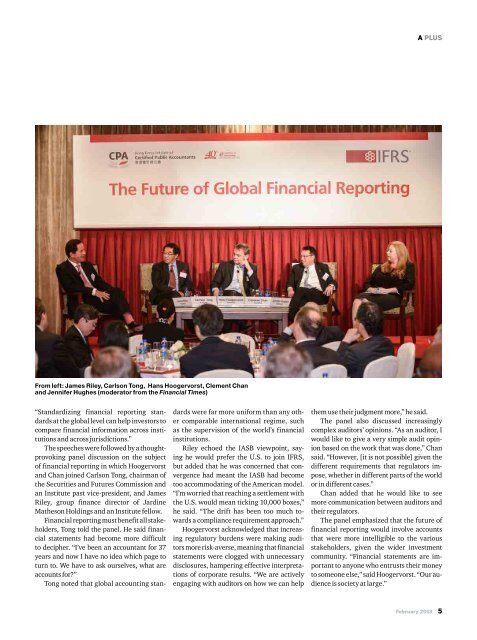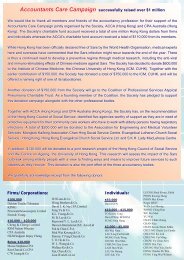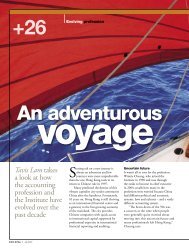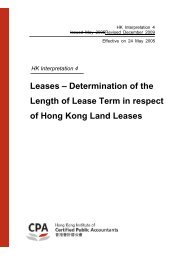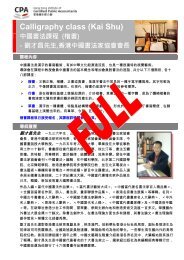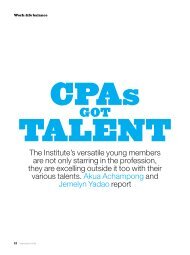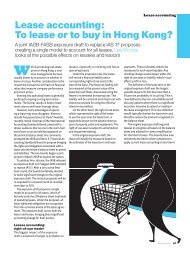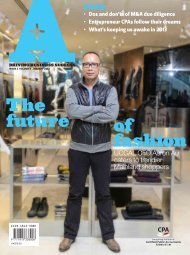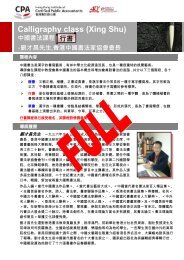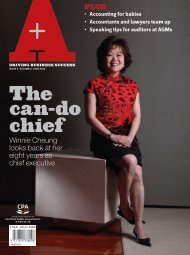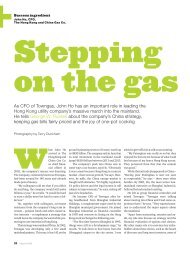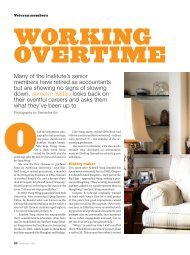power of love - Hong Kong Institute of Certified Public Accountants
power of love - Hong Kong Institute of Certified Public Accountants
power of love - Hong Kong Institute of Certified Public Accountants
Create successful ePaper yourself
Turn your PDF publications into a flip-book with our unique Google optimized e-Paper software.
From left: James Riley, Carlson Tong, Hans Hoogervorst, Clement Chan<br />
and Jennifer Hughes (moderator from the Financial Times)<br />
“Standardizing financial reporting standards<br />
at the global level can help investors to<br />
compare financial information across institutions<br />
and across jurisdictions.”<br />
The speeches were followed by a thoughtprovoking<br />
panel discussion on the subject<br />
<strong>of</strong> financial reporting in which Hoogervorst<br />
and Chan joined Carlson Tong, chairman <strong>of</strong><br />
the Securities and Futures Commission and<br />
an <strong>Institute</strong> past vice-president, and James<br />
Riley, group finance director <strong>of</strong> Jardine<br />
Matheson Holdings and an <strong>Institute</strong> fellow.<br />
Financial reporting must benefit all stakeholders,<br />
Tong told the panel. He said financial<br />
statements had become more difficult<br />
to decipher. “I’ve been an accountant for 37<br />
years and now I have no idea which page to<br />
turn to. We have to ask ourselves, what are<br />
accounts for?”<br />
Tong noted that global accounting stan-<br />
dards were far more uniform than any other<br />
comparable international regime, such<br />
as the supervision <strong>of</strong> the world’s financial<br />
institutions.<br />
Riley echoed the IASB viewpoint, saying<br />
he would prefer the U.S. to join IFRS,<br />
but added that he was concerned that convergence<br />
had meant the IASB had become<br />
too accommodating <strong>of</strong> the American model.<br />
“I’m worried that reaching a settlement with<br />
the U.S. would mean ticking 10,000 boxes,”<br />
he said. “The drift has been too much towards<br />
a compliance requirement approach.”<br />
Hoogervorst acknowledged that increasing<br />
regulatory burdens were making auditors<br />
more risk-averse, meaning that financial<br />
statements were clogged with unnecessary<br />
disclosures, hampering effective interpretations<br />
<strong>of</strong> corporate results. “We are actively<br />
engaging with auditors on how we can help<br />
A PLUS<br />
them use their judgment more,” he said.<br />
The panel also discussed increasingly<br />
complex auditors’ opinions. “As an auditor, I<br />
would like to give a very simple audit opinion<br />
based on the work that was done,” Chan<br />
said. “However, [it is not possible] given the<br />
different requirements that regulators impose,<br />
whether in different parts <strong>of</strong> the world<br />
or in different cases.”<br />
Chan added that he would like to see<br />
more communication between auditors and<br />
their regulators.<br />
The panel emphasized that the future <strong>of</strong><br />
financial reporting would involve accounts<br />
that were more intelligible to the various<br />
stakeholders, given the wider investment<br />
community. “Financial statements are important<br />
to anyone who entrusts their money<br />
to someone else,” said Hoogervorst. “Our audience<br />
is society at large.”<br />
February 2013 5


